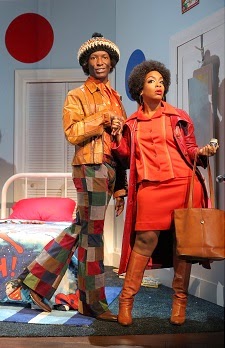 |
| James Earl Jones, Kristine Nielsen, Fran Kranz, Reg Rogers, Annaleigh Ashford,Patrick Kerr and Mark Linn-Baker. Photo by Joan Marcus |
Kaufman and Hart's Pulitzer Prize-winning "You Can't Take It With You," at the Longacre Theatre, is a very American comedy. It's about freedom and the pursuit of happiness.
Alice's father, Paul (Mark Linn-Baker) constructs elaborate fireworks in the basement with the aid of Mr. DePinna (Patrick Kerr), who has taken up residence in grandpa's home with them. Grandfather Martin Vanderhof (James Earl Jones) walked away from his office one day years ago, and spends his days at Columbia commencements and his evenings with the neighborhood cop on the corner.
Alice's mother, Penny (Kristine Nielsen) is a serial artist currently writing steamy plays.
Essie, Alice's sister, (Annaleigh Ashford) breaks into dance while her husband Ed Carmichael (Will Brill) plays Beethoven --with a little more he's composed-- on the xylophone. Her tutor, the boisterous Boris Kolenkhov (Reg Rogers, who seems to have been born for this role), indulges her despite her deficiences as a dancer. Rheba (Crystal Dickinson), the family's maid who lives in with her beau Donald (Marc Damon Johnson) takes a keen interest in the household's businesses, which include Essie's candy-making enterprise.
"You Can't Take It With You" is both profoundly subversive and sweetly innocent. Charming, well-acted, beautifully constructed, and fabulously staged with Scott Ellis at the helm and David Rockwell (sets) and Jane Greenwood (costumes) designing. "You Can't Take It With You" is as irrestible as Olga's (Elizabeth Ashley) blintzes, but that comes later.
 |
| Elizabeth Ashley as Olga. Photo by Joan Marcus. |
"You Can't Take It With You" is a romantic comedy. Expect to see the triumph of good sense.
Every performance, in minutest detail, is perfect in "You Can't Take It With You." In fact the cast are all entirely impressive. James Earl Jones subdues that big voice to play an amicable, wise and peaceable Martin Vanderhof . Rose Byrne is delightful. Elizabeth Ashley makes the most of her Olga, as Reg Rogers does with his Kalenkhov. Kristine Nielsen, Annaleigh Ashford, Patrick Kerr, Marc Damon Johnson and Mark Linn-Baker are understatedly screwball.
To learn more about "You Can't Take It With You," please visit http://youcanttakeitwithyoubroadway.com/. Hurry, tickets should be hard to get.
For additional commentary, http://lnkd.in/d7rJpzy








































